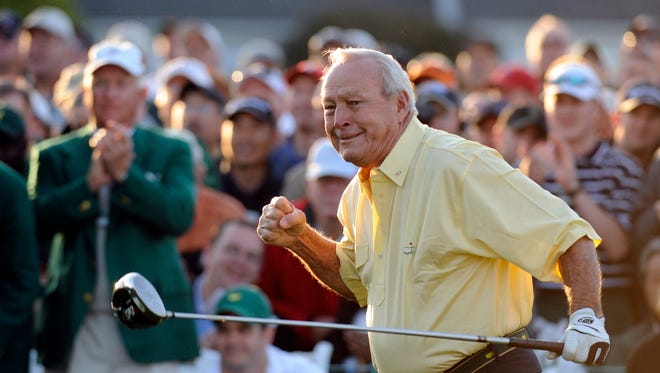Palmer's legacy lives on at Augusta National
AUGUSTA, Ga. — The Masters has lost some of its luster this year.

It has nothing to do with the rain, which wiped out a second day of practice rounds and the Par-3 Contest on Wednesday. Or the trademark azaleas, which bloomed three weeks early and robbed Augusta National of its vibrant color.
It’s the absence of Arnold Palmer, felt as keenly by those who knew him as those who thought they did. This country might not have a king but Augusta National sure did, and his death has left everyone who walks through its gates slightly adrift.
“It's a very awkward feeling to not have Arnold actually be here,” three-time champion Phil Mickelson said. “You feel his presence, (see) his display, his showcase in the Champions Locker Room — his jacket, clubs, scorecards from past victories.
“His spirit is here. It always will be here,” Mickelson added. “But to not actually have his physical presence is extremely awkward.”
MORE GOLF:
Masters is no cakewalk for caddies
Underestimate Dustin Johnson at your own peril
Palmer had already scaled back his appearances at the Masters before his death last September at 87. He hadn’t played in the tournament since 2004, his 50th anniversary, and had taken to hanging out on the first tee during the Par-3 the last few years.
On Thursday morning, he’d hit the ceremonial tee shot alongside good friends Jack Nicklaus and Gary Player and then quietly leave, letting the game’s current stars take center stage.
Still, he’d been there, and his presence somehow lingered. Now all that’s left are the memories.
But oh, what memories they are.
Charles Coody was a freshman at Texas Christian when he saw a man play a practice round and became utterly entranced. He didn’t know the man’s name — Palmer would later insist that his name was on the bag and Coody simply missed it — but knew he had to watch him play again.
“So I went back the next day and I became a member of an army that didn’t exist at the time,” said Coody, who won the Masters in 1971.
“He was just the right guy at the right time.”
Palmer was the rare athlete — heck, rare person — beloved by everybody. It didn’t matter how old you were or where you were from, to know about Arnold Palmer was to love him. He was disarmingly friendly, chatting with people in the gallery while he played and hanging around after his rounds to visit some more. When fans applauded him, he’d look them in the eye and wave.
Palmer won seven major championships, four of them at Augusta National, along with 55 other PGA Tour titles between 1955 and 1973. The peak of his career coincided with television becoming as common a household item as a toaster, and they were the perfect match.
“He had a magnetism that both men and women, he attracted them to golf,” Coody said.
“Arnie’s Army,” as his fans dubbed themselves, were passionate about their leader, so much so that they weren’t always so kind to his opponents.
But Palmer, ever gracious, always was.
“I don't know how many people realized how much Arnold took me under his wing when I was 20, 22 years old,” Nicklaus said. “I've said many times, I may have had to fight Arnold's gallery but I never had to fight him.
“He was very kind to a young guy starting out. I appreciated it very much.”
Palmer also passed on a piece of invaluable advice, telling Nicklaus he always wrote a note after a tournament thanking the sponsor. So Nicklaus started doing that, too.
“My later years of playing, part of that habit probably got relaxed by a lot of people because I've had a lot of sponsors come to me and say, `Jack, every year I get a letter from you. I don't get one from anybody else,’” Nicklaus recalled. “And that came from Arnold.”
It wasn’t just sponsors who Palmer wrote, either. Players from all generations talk about the notes they got from Palmer and how much they cherished them.
He left his mark on everyone he encountered, usually without trying. Masters chairman Billy Payne first played golf with Palmer before he was a member at Augusta National — before he’d started playing, really — and his memory of that round was Palmer’s kindness.
“I was completely in awe and he was so nice and so accepting of my embarrassing play,” Payne said, smiling at the memory. “I'm not sure I ever met a man who was more giving than Arnold Palmer. He had a profound influence on my life.”
There will be an official remembrance of Palmer before the start of the first round Thursday. Fans will get a commemorative Palmer badge, and Augusta National is making a “significant” donation to Palmer’s charitable foundation.
Masters organizers also kept Palmer’s bio in this year’s players guide, an honor not afforded to other deceased champions.
“Tomorrow will no doubt be an emotional goodbye,” Payne said. “But at the same time, an even more powerful thank you to the man we dearly love.”
Palmer left his mark on both the Masters and golf fans, and not even death can erase it.
***
Follow USA TODAY Sports columnist Nancy Armour on Twitter @nrarmour.
